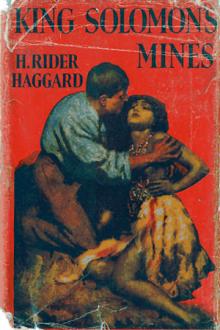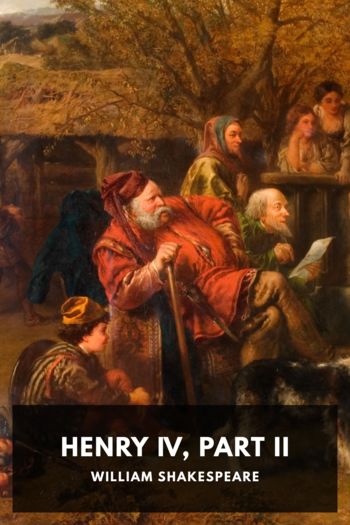King Solomon’s Mines, H. Rider Haggard [best mystery novels of all time TXT] 📗

- Author: H. Rider Haggard
Book online «King Solomon’s Mines, H. Rider Haggard [best mystery novels of all time TXT] 📗». Author H. Rider Haggard
That night we went on again with the moon, carrying as many melons as we could with us. As we ascended we found the air grew cooler and cooler, which was a great relief to us, and at dawn, so far as we could judge, we were not more than about a dozen miles from the snow line. Here we discovered more melons, and so had no longer any anxiety about water, for we knew that we should soon get plenty of snow. But the ascent had now become very precipitous, and we made but slow progress, not more than a mile an hour. Also that night we ate our last morsel of biltong. As yet, with the exception of the pauw, we had seen no living thing on the mountain, nor had we come across a single spring or stream of water, which struck us as very odd, considering the expanse of snow above us, which must, we thought, melt sometimes. But as we afterwards discovered, owing to a cause which it is quite beyond my power to explain, all the streams flowed down upon the north side of the mountains.
Now we began to grow very anxious about food. We had escaped death by thirst, but it seemed probable that it was only to die of hunger. The events of the next three miserable days are best described by copying the entries made at the time in my notebook.
“21st May.—Started 11 a.m., finding the atmosphere quite cold enough to travel by day, and carrying some watermelons with us. Struggled on all day, but found no more melons, having evidently passed out of their district. Saw no game of any sort. Halted for the night at sundown, having had no food for many hours. Suffered much during the night from cold.
“22nd.—Started at sunrise again, feeling very faint and weak. Only made about five miles all day; found some patches of snow, of which we ate, but nothing else. Camped at night under the edge of a great plateau. Cold bitter. Drank a little brandy each, and huddled ourselves together, each wrapped up in his blanket, to keep ourselves alive. Are now suffering frightfully from starvation and weariness. Thought that Ventvögel would have died during the night.
“23rd.—Struggled forward once more as soon as the sun was well up, and had thawed our limbs a little. We are now in a dreadful plight, and I fear that unless we get food this will be our last day’s journey. But little brandy left. Good, Sir Henry, and Umbopa bear up wonderfully, but Ventvögel is in a very bad way. Like most Hottentots, he cannot stand cold. Pangs of hunger not so bad, but have a sort of numb feeling about the stomach. Others say the same. We are now on a level with the precipitous chain, or wall of lava, linking the two Breasts, and the view is glorious. Behind us the glowing desert rolls away to the horizon, and before us lie mile upon mile of smooth hard snow almost level, but swelling gently upwards, out of the centre of which the nipple of the mountain, that appears to be some miles in circumference, rises about four thousand feet into the sky. Not a living thing is to be seen. God help us; I fear that our time has come.”
And now I will drop the journal, partly because it is not very interesting reading; also what follows requires telling rather more fully.
All that day—the 23rd May—we struggled slowly up the incline of snow, lying down from time to time to rest. A strange gaunt crew we must have looked, while, laden as we were, we dragged our weary feet over the dazzling plain, glaring round us with hungry eyes. Not that there was much use in glaring, for we could see nothing to eat. We did not accomplish more than seven miles that day. Just before sunset we found ourselves exactly under the nipple of Sheba’s left Breast, which towered thousands of feet into the air, a vast smooth hillock of frozen snow. Weak as we were, we could not but appreciate the wonderful scene, made even more splendid by the flying rays of light from the setting sun, which here and there stained the snow blood-red, and crowned the great dome above us with a diadem of glory.
“I say,” gasped Good, presently, “we ought to be somewhere near that cave the old gentleman wrote about.”
“Yes,” said I, “if there is a cave.”
“Come, Quatermain,” groaned Sir Henry, “don’t talk like that; I have every faith in the Dom; remember the water! We shall find the place soon.”
“If we don’t find it before dark we are dead men, that is all about it,” was my consolatory reply.
For the next ten minutes we trudged in silence, when suddenly Umbopa, who was marching along beside me, wrapped in his blanket, and with a leather belt strapped so tightly round his stomach, to “make his hunger small,” as he said, that his waist looked like a girl’s, caught me by the arm.
“Look!” he said, pointing towards the springing slope of the nipple.
I followed his glance, and some two hundred yards from us perceived what appeared to be a hole in the snow.
“It is the cave,” said Umbopa.
We made the best of our way to the spot, and found sure enough that the hole was the mouth of a cavern, no doubt the same as that of which da Silvestra wrote. We were not too soon, for just as we reached shelter the sun went down with startling rapidity, leaving the world nearly dark, for in these latitudes there is but little twilight. So we crept into the cave, which did not appear to be very big, and huddling ourselves together for warmth, swallowed





Comments (0)